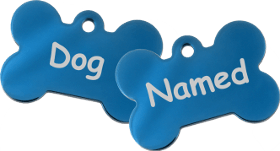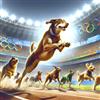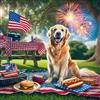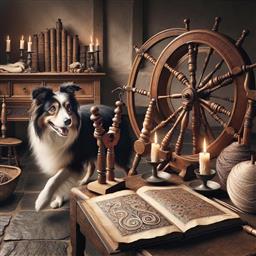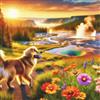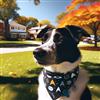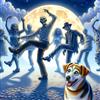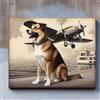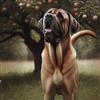1780s Dog Names - Page 5
Updated: June 21, 2024
Welcome to a unique and historical collection of canine monikers inspired by the 18th century. Step back in time to the 1780s, a period rich in history and culture from the American Revolution to the beginnings of the Industrial Revolution. This era, filled with significant events, also boasted a distinctive array of names, many of which make perfect, timeless tags for your four-legged friend.
Our carefully curated list draws inspiration from various sources, reflecting the period's charm and character. From names of famous figures who have shaped history to the vernacular of the time, each name carries an essence of the past. Whether you're a history buff, a lover of classic names, or someone seeking a unique identifier for your pet, this collection offers a plethora of choices, each one carrying its own story and significance.
So, delve into the past and embark on a fascinating journey of picking the perfect name for your furry friend from our catalogue. Remember, every name holds a piece of history, and choosing one from this list will not only make your pet stand out in the crowd but also add a historical touch to their identity.
| Name | Reason to Choose |
|---|---|
| Sally | Popular name for female dogs in the 1780s |
| Sampson | Dogs were often named after strong biblical characters |
| Seymour | English surnames were commonly used |
| Silas | This biblical name was popular in the 1780s |
| Sophie | Common name for female dogs |
| Sterling | Names with noble connotations were admired |
| Susannah | Biblical names were common during this time |
| Tabitha | Considered a common name during the 18th century |
| Thaddeus | Biblical names were prevalent |
| Theodosia | Greek names were commonly chosen |
| Titus | Roman names were fashionable |
| Toby | Common name for dogs in literature of the era |
| Ulysses | Literary names were also a trend in the 1780s |
| Unity | Names representing virtues were in fashion |
| Ursula | Old-fashioned names were favored during the 1780s |
| Ursuline | Religious names were popular among devout families |
| Venus | Named after the Roman goddess of love |
| Victoria | Reflects the historical context of the 1780s |
| Violet | Common names of the 1780s were often used for dogs |
| Virgil | Inspired by the famous Roman poet |
| Vivian | Names with Latin roots were often chosen |
| Whitney | English surnames were routinely used as first names |
| Wilfred | Old-fashioned names were in vogue during this time |
| Wilhelmina | Germanic names were prevalent due to immigration |
| Winston | Named after famous historical figures from the 1780s |
| Xanthus | Ancient Greek names were admired for their historical significance |
| Xenia | Greek names were admired for their unique sound |
| Xerxes | Historical names were in use during the 1780s |
| Yardley | English geographic names were prevalent |
| Yorick | Shakespearean names were in vogue |
|
Suggest:
|
Submitted!
|
| 1 2 3 4 5 6 | |
Popular 1780s Terms
| Name | Description |
|---|---|
| Admiral | Refers to the high rank in the navy |
| Baronet | An inherited title of honor popular in the 1780s |
| Cannon | Artillery piece used in warfare during the 18th century |
| Cavalier | A term referring to the horsemen and knights of the era |
| Colony | Many nations had colonies during the 18th century |
| Commonwealth | This term was popular as many nations were emerging as independent entities |
| Constitution | Many nations, including the United States, established their constitutions in the 1780s |
| Duchess | Represents the female rulers or wives of dukes in the 1780s |
| Empire | The 1780s saw the rise of many empires, including the British |
| Frigate | Warship used in the late 18th century |
| Galleon | Refers to the large multi-decked sailing ships |
| Garrison | Term for the troops stationed in a fortress or town |
| Gentry | Refers to the class of people below the nobility |
| Liberty | The term was prevalent during the American and French revolutions |
| Loyalist | Term used for American colonists who remained loyal to the British Crown |
| Marquis | A nobleman ranking above a count and below a duke |
| Minuet | A dance of the period |
| Musketeer | Refers to the military infantry prevalent in the 1780s |
| Patriot | Representing the people who fought for the American independence |
| Regiment | Refers to the military units of the era |
| Revolution | This was a common term due to the American and French revolutions |
| Sloop | A type of sailing boat popular in the 18th century |
| Sovereign | Term for a supreme ruler, particularly a monarch |
| Viceroy | Term for a ruler exercising authority in a colony on behalf of a sovereign |
| Victory | Common term used to celebrate wins in battles |
|
Suggest:
|
Submitted!
|
1780s Inventions
| Name | Description |
|---|---|
| Argand | In honor of Argand lamp, an important invention in lighting technology |
| Battery | After the invention of the voltaic pile, a type of battery |
| Bifocal | Reflecting Benjamin Franklin's invention of bifocal glasses |
| Blast | Indicates the hot blast technique for smelting iron invented in this period |
| Cotton | A nod to the cotton gin, an invention of this era |
| Crank | For the crank handle, an invention that made manual labor easier |
| Furnace | The hot blast furnace was a notable invention of the 1780s |
| Galvani | Honoring Luigi Galvani who made significant strides in bioelectromagnetics during the 1780s |
| Gaslight | After the invention of gas lighting, a major advancement in illumination |
| Hydraulic | After the hydraulic press, a notable invention of this era |
| Lithograph | Honoring the invention of lithography, a printing technique |
| Loom | To commemorate the power loom, a key invention in textile industry |
| Mercury | Honoring the mercury thermometer, a crucial invention of the 1780s |
| Mule | Mule spinning was a major invention in textile industry |
| Parachute | Inspired by the invention of the parachute in the 1780s |
| Pressure | In relation to the invention of the pressure cooker |
| Pump | A nod to the invention of the steam-powered water pump |
| Spindle | For the spinning jenny, which revolutionized the cotton industry |
| Steamer | After the steam-powered machinery that became popular in the 1780s |
| Stethoscope | Named after the medical instrument invented in this era |
| Telegraph | In honor of the mechanical telegraph, a remarkable invention of the 1780s |
| Thresher | Named after the machine invented in the 1780s to separate grain from stalks |
| Trolley | Commemorates the invention of the trolley pole used in trams |
| Turbine | Signifies the water turbine, a significant invention of the 1780s |
| Watt | James Watt invented the steam engine in the 1780s |
|
Suggest:
|
Submitted!
|
Literary Characters
| Name | Description |
|---|---|
| Austen | After Jane Austen, a prominent writer of the era |
| Bronte | After the Bronte sisters, who were famous authors of the period |
| Byron | Named after Lord Byron, a famous poet of the era |
| Candide | From the title character of Voltaire's Candide |
| Cecilia | From Fanny Burney's novel Cecilia |
| Chamfort | Named after the French playwright and philosopher, Nicolas Chamfort |
| Clarissa | From the heroine of Samuel Richardson's novel Clarissa |
| Darcy | Inspired by Mr. Darcy, a character in Jane Austen's Pride and Prejudice |
| Elinor | After a character from Jane Austen's Sense and Sensibility |
| Emma | Inspired by the title character of Jane Austen's Emma |
| Fantine | Inspired by a character in Victor Hugo's Les Misérables |
| Goldsmith | After Oliver Goldsmith, the author of The Vicar of Wakefield |
| Gothic | Pays homage to the popular literary genre of the 1780s |
| Gulliver | Inspired by the main character from Jonathan Swift's Gulliver's Travels |
| Heathcliff | From the character in Emily Bronte's Wuthering Heights |
| Hugo | Named after Victor Hugo, author of Les Misérables |
| Lovelace | Named after the charming but deceitful protagonist in Samuel Richardson's Clarissa |
| Pamela | Comes from the title character of Samuel Richardson's novel Pamela |
| Radcliffe | After Ann Radcliffe, a pioneer of the Gothic novel |
| Rochester | After the character from Charlotte Bronte's Jane Eyre |
| Rousseau | After Jean-Jacques Rousseau, a philosopher and writer of the time |
| Sterne | Named after Laurence Sterne, the author of Tristram Shandy |
| Voltaire | Named after the French Enlightenment writer, Voltaire |
| Werther | After the protagonist in Goethe's The Sorrows of Young Werther |
| Wordsworth | After William Wordsworth, a prominent poet of the time |
|
Suggest:
|
Submitted!
|
Geographical Locations
| Name | Description |
|---|---|
| Andes | Named after the Andes mountains, a significant geographical feature during the 1780s exploration era |
| Berlin | A tribute to Berlin, Germany, a center of Enlightenment thinking in the 1780s |
| Bordeaux | A tribute to the French city, a center of commerce in the 1780s |
| Boston | Named for Boston, Massachusetts, a hotbed of American Revolutionary activity in the 1780s |
| Cairo | In honor of the Egyptian city, an important crossroads in the 1780s |
| Calcutta | Named for Calcutta, India, a key British colony during the 1780s |
| Delaware | Recognizes the Delaware River, a major waterway during the 1780s |
| Dublin | Recognizes Dublin, Ireland, a major cultural center in the 1780s |
| Erie | Named for Lake Erie, a significant North American geographical feature during the 1780s |
| Geneva | In honor of Geneva, Switzerland, a hub of diplomacy in the 18th century |
| Havana | Named after Havana, Cuba, a key trading port in the 1780s |
| Hudson | After the Hudson River, explored in the 1780s by Europeans |
| Lisbon | Recognizes the importance of Portugal during the Age of Discovery |
| Madrid | After Madrid, Spain, a major European capital during the 1780s |
| Manila | A nod to Manila, Philippines, an important Spanish colony during the 1780s |
| Orleans | A homage to New Orleans, founded in the 18th century |
| Quebec | A nod to Quebec City, a significant French settlement in the 1780s |
| Savannah | A nod to Savannah, Georgia, established in the 18th century |
| Sydney | In tribute to Sydney, Australia, established as a British colony in the late 18th century |
| Thames | Honors the River Thames, an important British trade route during the 1780s |
| Tokyo | In honor of Tokyo, Japan, a city with a rich history dating back to the 18th century |
| Venice | Celebrates the Italian city, a hub of culture and trade in the 18th century |
| Versailles | Recognizes the Palace of Versailles, a symbol of absolute monarchy in the 1780s |
| Vienna | A nod to Vienna, Austria, a center of European culture in the 1780s |
| Yorktown | In honor of the Battle of Yorktown, a key event in 1780s American history |
|
Suggest:
|
Submitted!
|
Historical Figures
| Name | Description |
|---|---|
| Adams | John Adams played a leading role in the early stages of the American Revolution |
| Burgoyne | John Burgoyne was a British army officer, politician and dramatist |
| Clinton | Henry Clinton was a British army officer and politician, best known for his service as a general during the American War of Independence |
| Cornwallis | Charles Cornwallis was a British Army general and official. In the United States and the United Kingdom he is best remembered as one of the leading British generals in the American War of Independence |
| Franklin | Benjamin Franklin was one of the most influential figures during the American Enlightenment |
| Gates | Horatio Gates was a retired British soldier who served as an American general during the Revolutionary War |
| Greene | Nathanael Greene was a major general of the Continental Army in the American Revolutionary War |
| Hamilton | Alexander Hamilton, one of the Founding Fathers, was a prominent figure in the 1780s |
| Hancock | John Hancock was a patriot of the American Revolution and president of the Continental Congress |
| Jay | John Jay was a statesman and one of the Founding Fathers of the United States |
| Jefferson | Thomas Jefferson authored the United States Declaration of Independence in the 18th century |
| Knox | Henry Knox was a military officer of the Continental Army |
| Lafayette | Marquis de Lafayette was a key ally of the American colonists during the Revolutionary War |
| Madison | James Madison, known as the 'Father of the Constitution', was a prominent politician |
| Marshall | John Marshall was a politician and the fourth Chief Justice of the United States |
| Monroe | James Monroe was an influential figure in American politics during the late 18th century |
| Morgan | Daniel Morgan was a United States Representative from Virginia and a brigadier general in the American Revolutionary War |
| Paine | Thomas Paine authored influential pamphlets at the start of the American Revolution |
| Putnam | Israel Putnam was an American army general and Freemason who fought with distinction at the Battle of Bunker Hill during the American Revolutionary War |
| Revere | Paul Revere was a silversmith and a patriot in the American Revolution |
| Rochambeau | Jean-Baptiste Donatien de Vimeur, comte de Rochambeau was a French nobleman and general who played a major role in helping the Thirteen Colonies win independence |
| Stark | John Stark was a New Hampshire native who served as a major general in the Continental Army during the American Revolution |
| Warren | Joseph Warren was an American physician and a major general during the American Revolutionary War |
| Washington | In honor of George Washington, the first American president who served from 1789 |
| Wayne | Anthony Wayne was a United States Army officer and statesman |
|
Suggest:
|
Submitted!
|
User Submitted Images
There are currently no user submitted images for this page. This is your opportunity to be the first! Submit your photo below.
User Recommendations
There are currently no name recommendations for this page. This is your opportunity to be the first! Make your recommendation below.
Recently Updated
We would like to take this time to thank all of our visitors that make DogNamed.com the best dog naming resource on the web. Our site would not be where it is today without your suggestions, ratings, and photo submissions. So pat yourselves on the back for a job well done and keep up the good work! If you have any comments, suggestions, or ideas for the this page or any part of our site, don't hesitate to drop us a line on our Contact Page. Thank you! -The DogNamed Team
